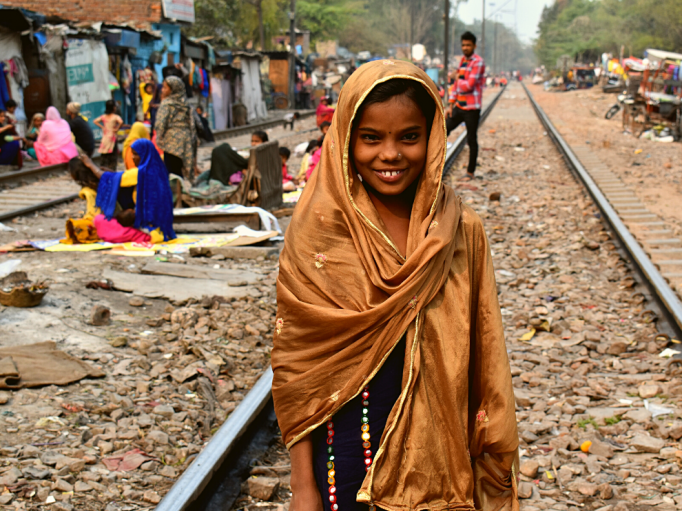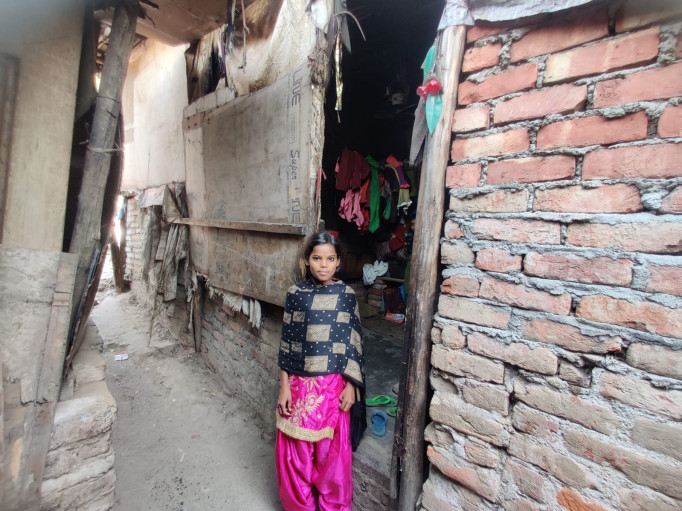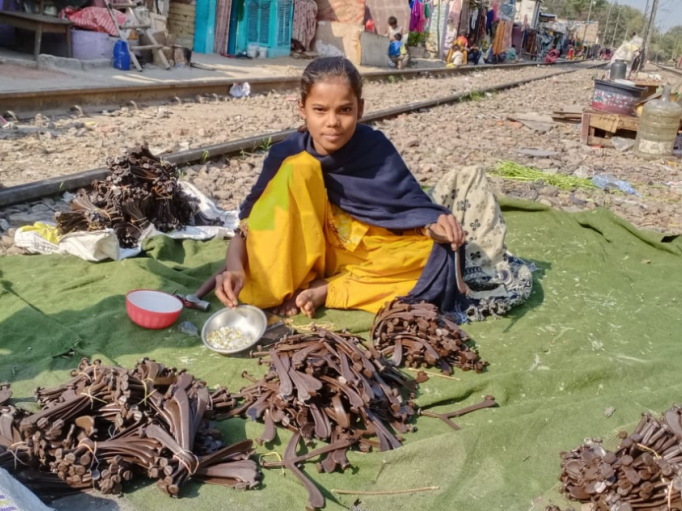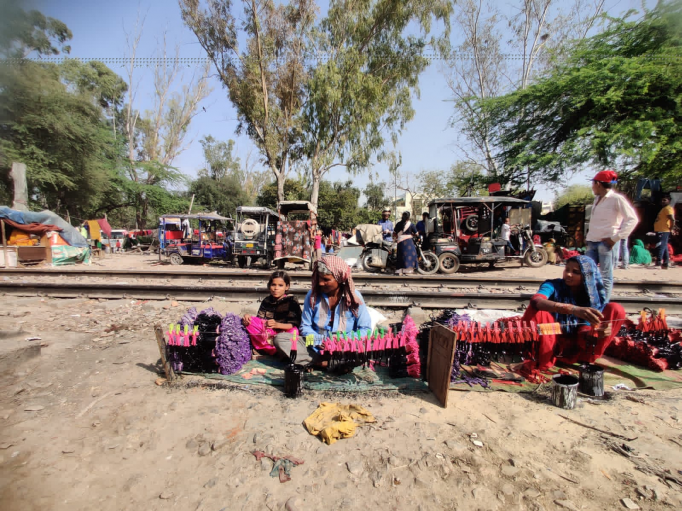“The best thing about this work is that I do this work while sitting and I do not have to go to the factory to get the goods.” Shaheen

Have you ever considered the processes that go into making a new pair of sandals? For children like 11-year-old Shaheen, being part of this process is vital to survival, especially because it means adding an additional 80-100 rupees (80p-£1) to her family’s daily income.
A railway slum to call home
For her whole life, Shaheen has lived in a temporary slum settlement by the side of one of Delhi’s busy railway lines. Her family originally come from the Bihar region in the north of India, but migrated to the capital for work a few years before Shaheen was born. Her father earns a living by pulling a rickshaw that he rents, while her mother works in a local factory, packing spices like red chili, turmeric and coriander for sale. Between them, it is rare that they earn more than 200 rupees (~£2) per day, making it very difficult to provide for their five daughters and son. Recently, their oldest daughter, who is just 14, has started going to work at the spice factory as well, just to help out, while Shaheen is tasked with looking after her younger siblings.
Shaheen’s mum hopes that one day the children will be able to go to school instead of working as she knows that is what is best for them.
“We don’t have any fixed work. Whenever we can find it, we do it but the rest of the time we just wander around looking for work.” Asma, Shaheen's mother

An office on the train tracks
As well as looking after her siblings, Shaheen also contributes to the family income by designing and painting sandal straps before they are added onto the soles. She learned the skill from her aunt at a very young age and is now very efficient at the task.
Each day, someone from the factory comes to her community with large bags of the straps and children go to collect piles of them to work through for that day. At the same time, they collect the raw materials they need to finish the designs and the painting before setting up their makeshift studios on blankets and tarpaulins by the side of the train tracks.
The working conditions are dangerous – being so close to the tracks is a high risk activity and it’s not uncommon for children to get hurt as trains thunder by.
“There is only one small room in my house, and I’m not able to do my work in such a small space because the raw materials come in big sacks. I fear about trains coming unexpectedly and blowing the horn during the day and night hours but otherwise, the community has the timetable for the trains passing by.”
After carrying all the straps they can carry on their heads back to their spot by the tracks, Shaheen and one of her younger sisters can earn 50-100 rupees each (about 50p-£1) for 3-4 hours of work, earnings which are gratefully received by their mum to use towards household expenses.
“The best thing about this work is that I do this work while sitting and I do not have to go to the factory to get the goods. The hardest part of my work is that many times during the designing and colouring of the slipper straps work, my hand gets stuck in the hammer, and then it hurts a lot whenever I do strapwork on the slippers or do household chores. It hurts the most when I do some work with water and soap like washing dishes or clothes. But my family has no ointment at home nor we can visit a hospital or clinic for this kind of injury, but it hurts so much most of the time. I enjoy my work designing and painting the slipper straps as now I can do it without much effort and hard work as I’ve been doing this work for many years so I’m expert now. I also do household chores including cleaning and cooking, along with my strap painting and designing work. I prefer to do household chores as it allows other members of my family to perform their duties without the stress of household chores.”

No education, but hope for the future
Circumstances have meant that Shaheen and her siblings have never been able to go to school because her parents don’t understand how important an education can be. In addition, a lack of official documents means that they can’t register for classes, but one day Shaheen hopes to be able to enrol.
“I’m interested in going to school and I want to be a doctor when I grow up. By becoming a doctor, I want to be able to help people in my community. I think a lot about going to school and feel sad because when I see the children of my age going to school and playing with their friends and on the other hand, I am working day and night and earning for my family. One day though, I hope that will be me – I’d also encourage others who are still not enrolled to go to school.”
“If I go to school, I’d stop working and would study diligently – I know then I’d definitely become a doctor.” Shaheen
